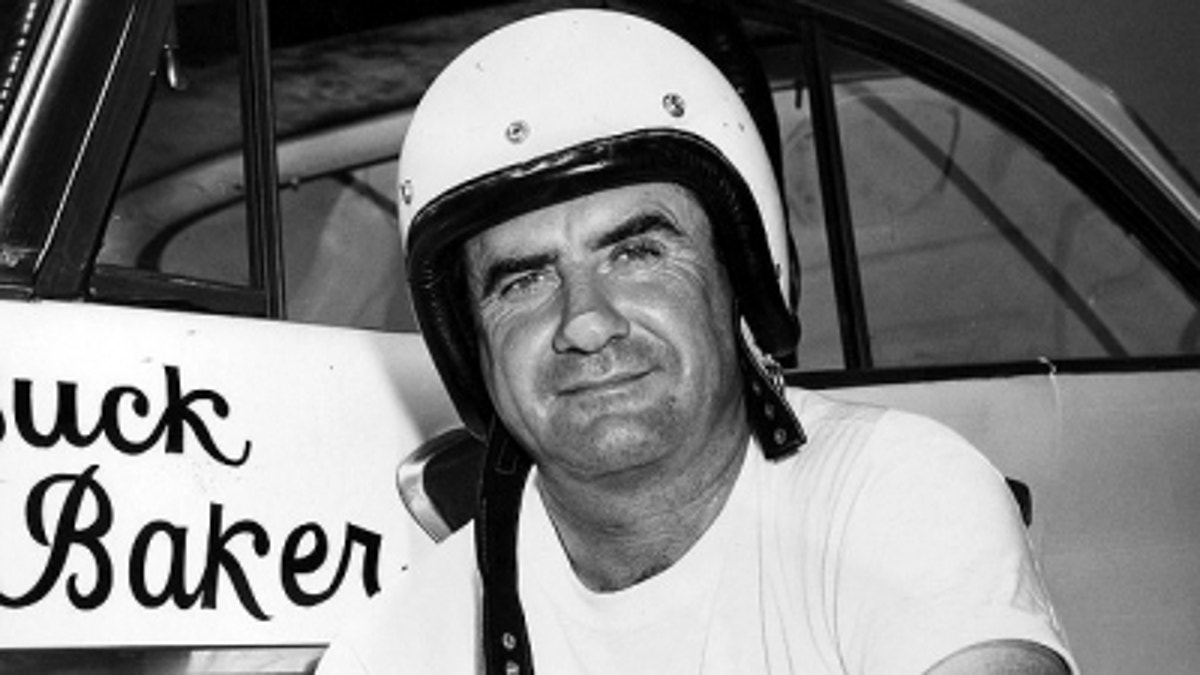
Looking for the definition of “old school” in NASCAR racing? Don’t look past Buck Baker.
Named this week as one of the five members of the fourth class of the NASCAR Hall of Fame, Baker was a tough-as-nails, ask-no-quarter-and-give-none driver who occasionally lost a race but never a fight.
“Racing was tough all the way around in the old days,” Baker said in retirement. “I used to tell the guys in the pits that we’d race for 30 minutes and fight for an hour.”
Prior to jumping into stock car racing in the 1940s – he drove in the first Sprint Cup (then Strictly Stock) race in June 1949, finishing 11th and winning $50, Baker drove a bakery delivery truck. Perhaps more appropriately, considering the spin his life would take, he also was involved in the backroads transport of illegal whiskey, a proving ground for several of NASCAR’s pioneer drivers.
Elzie Wylie “Buck” Baker’s Cup career stretched from the series’ first season (1949) to 1976, when he drove a few races mostly to amuse himself. At the age of 57, he finished sixth in the spring race at Darlington Raceway in 1976, his final season.
Baker drove sporadically over the final years of his career, and that activity delayed his almost-certain election to the National Motorsports Press Association Hall of Fame, a Darlington, SC-based hall that is heavily NASCAR-flavored. Hall eligibility rules require that a driver be retired for a certain period. When a journalist pointed out that Baker, who had been nominated for a particular class, wasn’t yet eligible, Baker paraded to the journalist’s hotel room during a race weekend and, when invited in, punched the writer in the nose.
In the 1950s, when the race cars were considerably less sophisticated than those of the modern era, parts often fell off the vehicles. This wasn’t necessarily a critical thing, but it was in Baker’s case one night on a dirt track because the part was the steering wheel. Baker, not flustered, picked up a pair of vise grips from the car’s floorboard and “steered” the rest of the race using that unlikely substitute.
He was a tough bird.
Baker made his name quickly. He became the first driver to win the Cup championship in consecutive years, driving for noted team owner Carl Kiekhaefer in 1956 and for himself in 1957.
In the year before his first title and the year after his second, Baker finished second in the standings, stringing together one of the most remarkable four-year runs in the sport’s history.
Baker also is widely remembered for a race he didn’t win.
In Jacksonville, Fla., in 1963, he was flagged as the winner, although black driver Wendell Scott (a NASCAR Hall nominee) actually finished first. Baker was awarded the race trophy and enjoyed the victory lane celebration, but subsequent checks of the scorecards confirmed that Scott had won the race, marking the first – and only – win by a black driver in NASCAR history.
Promoters apparently were concerned about the possible negative impact of a black driver being showered with the spoils of victory, so Baker was the temporary substitute in one of the ugly stories from the sport’s past.
Baker’s most productive victory seasons were his two championship years. He won 14 times in 1956 and 10 times in 1957.
From 1953 to 1961, he finished no worse than 10th in the point standings.
Named one of NASCAR’s 50 greatest drivers in 1998, Baker scored his last win in 1964 and raced more-or-less full time for the final time in 1966, when he ran 36 of 49 events.
A native of Richburg, S.C., Baker lived in Charlotte, N.C., most of life and died there in 2002 at the age of 83.
Mike Hembree is NASCAR Editor for SPEED.com and has been covering motorsports for 30 years. He is a six-time winner of the National Motorsports Press Association Writer of the Year Award.








































